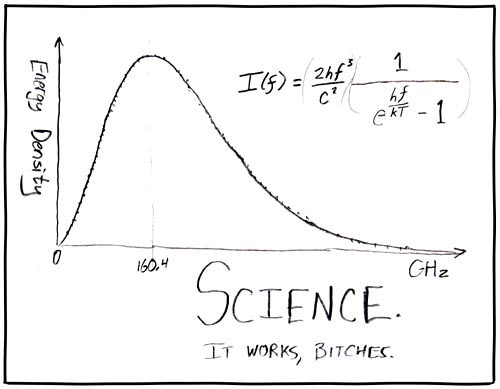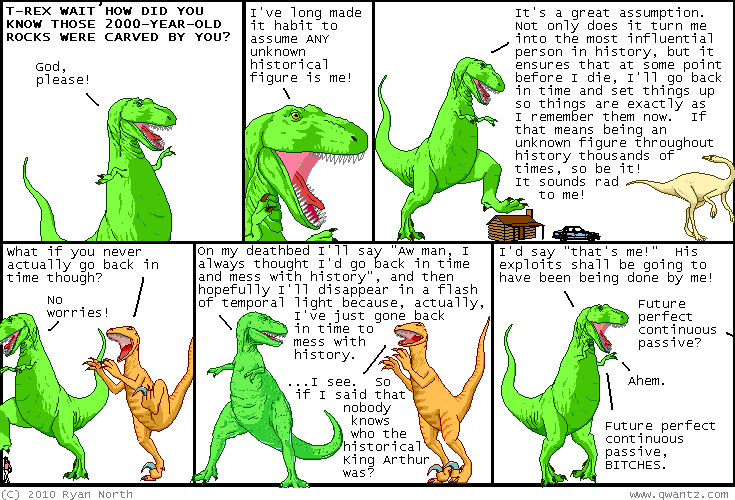Future perfect continuous passive?
« previous post | next post »
Yesterday's Dinosaur Comics explores the far reaches of verbal morphosyntax in English:
(As usual, click on the image for a larger version.)
There are some terminological issues, but it would be inappropriate to be critical of someone who uses the term "passive" to refer to a genuine instance of the passive voice.
The system is in principle recursive, so that nothing but a bit of effort stands between you and semi-plausible uses of even more elaborate forms, like "will have been going to have been being done by me".
A small usage note: final vocative "bitches" has become a sort of particle indicating ironic triumph, used even (or especially?) in otherwise PC contexts, e.g. the well-known xkcd strip:

And of course the t-shirt as well:


[links] Link salad tries to go lite, fails | jlake.com said,
February 17, 2010 @ 9:43 am
[…] Future perfect continuous passive? — Language Log uncovers a new English verb tense. […]
jfruh said,
February 17, 2010 @ 9:48 am
For what it's worth, Dinosaur Comics creator Ryan North has a master's degree in computer science with a focus on computational linguistics, so he ought to know his tenses.
uberVU - social comments said,
February 17, 2010 @ 10:06 am
Social comments and analytics for this post…
This post was mentioned on Twitter by languagelog: Future perfect continuous passive?: Yesterday's Dinosaur Comics explores the far reaches of verbal morphosyntax in… http://bit.ly/cRKxS0…
Dan Lufkin said,
February 17, 2010 @ 10:22 am
Wow! This opens up new vistas in complex tenses. Chomsky's trifecta P This book has been being bound for six months can become Come next Tuesday, this book will be going to have been being bound…. And if something happens before Tuesday, you can add a little modality: This book ought to have been going to have being bound…
A syntactic structure to be proud of, indeed.
Dan Lufkin said,
February 17, 2010 @ 10:26 am
Whoops! Make that This book ought to have been going to have been being bound … Dunno how I could have made such an elementary mistake.
Ralph Hickok said,
February 17, 2010 @ 10:50 am
Of course, Douglas Adams also explored the linguistic complexities created by time travel in Hitchhiker's Guide to the Galaxy.
Army1987 said,
February 17, 2010 @ 10:52 am
Apparently in English the past/nonpast, future/nonfuture, passive/nonpassive, progressive/nonprogressive, and perfect/nonperfect are all independent, i.e. all 32 possible combinations ("builds", "built", "will build", "would build", "is built", "was built", "will be built","would be built", "is building", "was building", …, "would be being built", "has built", "had built", …, "would have been being built") are grammatical. Cool!
John Lawler said,
February 17, 2010 @ 10:55 am
Oh, if we wish to account verbal constructions as complex tenses, we can go lots farther than this. I once made this point with a list in an alt.usage.english post, while pointing out that English has only two inflectional tenses (a claim which annoys peevers no end).
[(myl) Indeed. But as I said, he got the "passive" part right, so let's cut him some slack.]
Ken Brown said,
February 17, 2010 @ 11:23 am
I think I have heard "having been about to be {verbed}" in real life. It gets a few Google hits,
Karen said,
February 17, 2010 @ 11:47 am
Also, notice he doesn't actually use the word "tense". "Construction" could as easily (knowing Ryan, more easily) be the missing word.
Karen said,
February 17, 2010 @ 11:48 am
Oh, spit. He does use it in the mouseover!
[(myl) Which, as I should have noted in the post, reads "one cuss allowed for every successful use of this most excellent of tenses, and it is a real tense too, you could be using it RIGHT NOW if you but dared".]
Joel said,
February 17, 2010 @ 12:49 pm
More time travel grammar from the BBC sci-fi comedy Red Dwarf:
LISTER: Hey, it hasn't happened, has it? It has "will have going to have happened" happened, but it hasn't actually "happened" happened yet, actually.
RIMMER: Poppycock! It will be happened; it shall be going to be happening; it will be was an event that could will have been taken place in the future. Simple as that.
Nik said,
February 17, 2010 @ 1:58 pm
I am sorry to interrupt, I have been a learner of English for 8 years now, but I still cannot figure out what type of sentence this is:
"It's time you got out of here."
In the sense that, "the bomb is about to blow, get out of here now" or "The last ship out of Pandora is leaving NOW, get on it now!"
But why is that it is "got" out of here instead of "get" out of here?
Thank You
[(myl) Short form: it's a declarative irrealis-mood clause, and (except for were/was) English verbs use the preterite form for irrealis clauses, like "it's time that you went away", or "I'd prefer if you went away", or "I wish that you went away more often". See e.g. here.]
H Crider said,
February 17, 2010 @ 2:06 pm
Tenses can occasion some fantastically weird humor, I've found. For another example, see "Today We Learn English": http://www.somethingawful.com/d/news/today-we-learn.php
Spell Me Jeff said,
February 17, 2010 @ 3:02 pm
@Nik
I believe that is a subjunctive "got," indicating that the statement is suggestive or predictive, not an actual statement of fact or an assumption that the getting will actually occur.
It's the sort of idiom that some speakers will use and others will not, at their liking, and probably without either of them knowing exactly why they choose one or the other. Younger speakers probably will not choose it at all.
[(myl) For a convincing argument that it's irrealis and not subjunctive (it convinced me, anyhow), see Geoff Pullum's comment on this post:
]
Jim said,
February 17, 2010 @ 3:11 pm
Futurama manages to pull one of these off without even involving time travel, though to be fair there are parallel universes involved:
MB said,
February 17, 2010 @ 3:49 pm
The perfect continuous passive features as a favorite construction with which to pursue Quirk-baiting in David Crystal's autobiography, _Just a Phrase I'm Going Through: My Life in Language_ (2009: 102-3).
Sarang said,
February 17, 2010 @ 3:56 pm
There was that Dave Chappelle episode about the "racial draft" in which the Wu Tang Clan (having been drafted by the Asians) says "konnichiwa, bitches." I wonder if this was what started the trend…
Karen said,
February 17, 2010 @ 4:07 pm
@Nik – similarly, it's "it's time you did this" or "left here" … the past tense is used for these statements that indicate irrealis (unreal, not factual) moods – subjunctive or conditional among them.
anon said,
February 17, 2010 @ 4:10 pm
This is not the first time that Dinosaur Comics itself has used the final vocative "bitches."
That's right! Phlogiston, bitches!
John Walden said,
February 17, 2010 @ 4:30 pm
"If that bridge hadn't been finished the day before yesterday, yesterday it would have still been being built"
Bitches
Army1987 said,
February 17, 2010 @ 5:10 pm
I was thinking more about stuff like "When I was in Barcelona, a guy told me that by the end of the month the Sagrada Familia would have been being built for 120 years".
[(myl) So if this is true, then at the time you were in Barcelona, the Sagrada Familia would have been about to have been being built for 120 years. Right?]
Jerry Friedman said,
February 17, 2010 @ 6:31 pm
@John Lawler: I'm a peever, and I found your post about tense interesting and convincing, as I find most of your posts in a.u.e.
@John Walden: As I recall, 19th-century prescriptivists used examples like that to ridicule the fashionable verbosity being built. Yesterday the bridge would still have been building.
Army1987 said,
February 17, 2010 @ 6:36 pm
Ouch! (That was an example and actually I've never been to Barcelona, but the first time I read your comment I didn't even notice there was anything strange in it. The second time, the [INSERT MADE-UP NAME HERE] tense of "build" spanning almost an entire line of text had become something painful to even look at.)
Army1987 said,
February 17, 2010 @ 6:40 pm
How would the 19th-century prescriptivists cope with verbs which don't have "absolutive" (was that the term) meanings when intransitive (e.g. "eat": "I ate" doesn't mean "I was eaten")?
Gordon Campbell said,
February 17, 2010 @ 7:49 pm
I find myself being a bit of a train spotter for obscure verb formations like this. You can find them in grammar textbooks, of course, but it is truly exhilarating to find them in the wild. They are rare and beautiful things.
Searching for “will have been being” on the net, I found that I had to search through pages of ESL sites before finding any naturally occurring specimens. It's good to know they're out there, roaming free.
Alec said,
February 17, 2010 @ 11:05 pm
Ursula K. LeGuin's Always Coming Home starts out "The people in this book might be going to have lived a long, long time from now in Northern California".
J. Goard said,
February 17, 2010 @ 11:52 pm
The system is in principle recursive, so that nothing but a bit of effort stands between you and semi-plausible uses of even more elaborate forms, like "will have been going to have been being done by me".
On one kind of theory. To the contrary, theories wherein recursive structure emerges from use via schematization and analogy, with frequency playing a major role, would seem to predict that a less complex structure would win out in these cases, since the more complex structure is (i) so rare, (ii) its semantics so hard to conceptualize, and (iii) its differences from the simple structure lacking in strong functional advantage.
Consciously linguistic joking aside, we would expect something like his exploits shall have been done by me: probably not a very frequent construction in itself, but only a "one-off" from several frequent constructions, thus not too taxing on the parser.
Generativist principle aside, the strip's example is funny to me precisely because it is so not human language, like the way people catch out an android spy in SF.
Corey B. said,
February 18, 2010 @ 10:40 am
Here in the urban Southern US (Atlanta, actually), you often hear things like the following (and I am guilty as well, these are some of my favorite kinds of slangy constructions)
"I might ought to do X…."
i.e. "It is possible, but as yet uncertain, that I will be required to do X instead of Y at some point in the future"
It's fun! There are many other possibilities. (Are these subjunctive modalities? I am a mere layman, not an official card-carrying linguist)
Benjamin Zimmer said,
February 18, 2010 @ 10:53 am
Corey: What you've got there is a double modal, a construction that has been discussed on LL several times (might oughta is mentioned here and here).
Amir Doroudian said,
February 18, 2010 @ 12:00 pm
Is it really possible to use "will" and "be going to" simultaneously?
I think it should be either:
– His exploits will have been being done by me. OR
– His exploits are going to have been being done by me.
Corey B. said,
February 18, 2010 @ 1:02 pm
Benjamin, thanks for the link to the field guide and others. I recognize many of these!
Good to know I can always count on the Language Log when there's a construction somewhere that ought to be going to have been catalogued :)
Jason Cullen said,
February 19, 2010 @ 12:31 pm
OK, Mark was right to refer to the form of "If I were," "got," et al. as irrealis forms as he defers to the Cambridge Grammar. However, Mark was originally answering a question from a second-language learner, and I think that 'Spell Me Jeff' was right to ask if this is a subjunctive.
I think both Geoff Pullum and Mark are right to introduce the distinction and say that we need to talk about irrealis forms and subjunctives. However, this was an ESL moment, and while I think Language Log isn't the best place to go for ESL questions, Mark wasn't really helping by not first "explaining to help a learner speak English" and then introducing grand new terms and ideas of English Syntax. Or else he should might have ignored the usage question altogether. (I use the Cambridge Grammar all the time to help me understand what's going on; however, I use more traditional terms or the terms in Betty Azar's "Understanding English Grammar" when explaining grammar to my university students in ESL. I can argue theory with my colleagues without giving a burden of theory to my students.)
Nik said,
February 20, 2010 @ 8:15 am
Thank You, myl, Spell Me Jeff, and Jason Cullen, for your explanations. — Jason, thank you for your understanding that while I have been using English as my primary language for 8 years now, I might still be needing something more straightforward, though not necessarily complete, for comprehending new concepts. New to me, at least. — I happen to have learned German for a few years, too, for math and physics. They have something called the Konjunktiv I and II, most books say they should be called Subjunctive I and II instead. But here is where I learned that 'were' and 'had' are the only surviving hypothetical-indicating words. As in 'Had I bought more shares, I would have been a millionaire", where I didn't actually buy more share in that company. By 'only surviving', I think it means that they are the only verbs that use self-changing (I'm unsure to call it conjugation or declination or inflection) to indicate 'hypothesized situation' in English.
But I couldn't understand what sort of mood or indication the seemingly past tense of the verb 'to get' is signaling as in "It's time you got out of here". I mean, he *can* still get out of there, if he wants, so it isn't really a hypothesis that cannot happen like my trying to go back in time to buy more shares.
The mood here-I am trying to understand-is to persuade, to suggest what needs to happen. But if that's the case, I was thinking to myself, doesn't 'should' and 'must' do most of that already? "You should eat your vegetables". "You mustn't be late".
I will read up on the irrealis. I don't have that dictionary, I hope Wikipedia is okay. They are never wrong, right?
Regards
Nik
Aaron Davies said,
March 3, 2010 @ 10:05 pm
@nik: conjugation is for verbs; declension (not declination) is for nouns, pronouns, and adjectives, not that there's much of it in English. inflection refers to both, as well as to any other part of speech that changes form in a similar way. (some languages inflect prepositions, for instance.) or at least that's the traditional usage; i make no representations as to what the CGEL may or may not say on the subject. ;-)
Aaron Davies said,
March 3, 2010 @ 10:08 pm
re: the lawler aue post linked above, i find "ex-mother-in-law-to-be" intriguingly ambiguous. does it imply a divorce or a broken engagement?